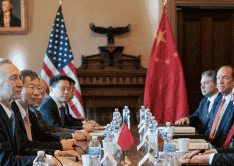Part of the economic debate in Latin America, particularly in Argentina after the elections, focuses on what type of financial and trade relationship is most convenient for the region, and several discussions consider the merit of strengthening relations with China instead of the United States
The first thing we should understand is that it is a false dilemma. Latin America is not in an economic situation where it can afford to “choose” trading and financial partners. Therefore, the answer is simple: Latin American countries must strengthen their commercial relations with all countries, including China and the United States, and the way to do it is by improving transparency and reliability.
Why do some politicians repeat that their country has to choose between one and the other? There is a misconception among some commentators, who think that entering into aggressive agreements with China is much more beneficial, cheaper, and, in addition, will allow countries like Argentina or Mexico to diversify their position. The most populist politicians talk of China as if the country gave money for nothing. It is a ludicrous and misguided view of relations with China, as if the business partners and Chinese rulers were not going to demand the same conditions as US ones. The evidence from Venezuela, Ecuador, and many African nations is clear: China does not hand out free money. Money for nothing does not exist. The Chinese are neither fools nor amnesiacs.
The experience of decades shows us that many populist rulers believed that they would enter into large trade agreements with China and receive low-cost financing with no burdens attached. The example of Ecuador during Correa period shows us that this idea of enormous financing at no cost is completely false. China is not only as rigorous and demanding as any other trading partner, but — in many cases — has shown that it imposes conditions, especially collateral in natural resources, that sometimes are stricter.
Usually, the idea that China is going to offer favorable, flexible, and even almost-free conditions usually comes from a mistaken perception that the Asian country will finance the expansion of socialist or leftist models without conditions as if it were a donation. Nothing could be more wrong. China is an economy that is extremely dependent on the US dollar and has an elevated debt. Above all, it is an economy with a growing demand for commodities and, as such, usually lends money in exchange for wide access to natural resources. The Chinese economy is not a source of cheap donations and loans. Its companies and rulers have a very clear idea of the risk they take when they lend money to socialist regimes and countries with economic challenges. China always analyzes carefully the real economic return it needs in its business transactions. There is no free money.
We cannot think that China will give Argentina or Mexico free money or investments, or that it will demand less credit security than the United States. Quite the opposite. China, as a business partner, is much more demanding and rigorous than some politicians would prefer.
Sometimes, in the discussion about whether to favor China or the United States, there is a hidden line of thought, which could be summed up as, “Who can we default on without generating a financial crisis? Who will finance the unfinanceable at a low cost?” The answer is simple. Nobody.
The opportunity for Latin America? Open the economy, become an exporting power and attract foreign investment. To achieve this, countries must make legal and investment security the absolute pillars of their commercial and financial policies. Becoming a reliable country with unquestionable credit responsibility is a capital factor for economic recovery.
No country is going to give dollars for cents, or finance insane economic policies for free, as everyone starts with an analysis of risk of devaluation and default when they consider financing options. What Latin American governments must do is eliminate those two risks so that China, the US, and all the countries of the world perceive the enormous potential of the region.
Reprinted from the Mises Institute.







